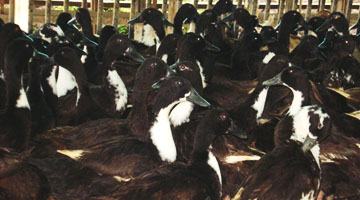 The duck egg industry is small compared to that of chicken. But the 429,700 raisers who depend on duck production (BAS, 2010) attest to its importance in the Philippine economy.
The duck egg industry is small compared to that of chicken. But the 429,700 raisers who depend on duck production (BAS, 2010) attest to its importance in the Philippine economy.
However, production in the past five years has been declining. Volume dropped to an average of 5.42 percent while its value represented an increase of 0.21 percent only. Decline in quality breeder ducks and an unstable supply of ready-to-lay pullets are among the major factors contributing to this downtrend.
A sustainable system to produce breeders will soon boost the local duck industry via a P16-million project “Development of sustainable breeder Philippine mallard duck production system”. The Philippine Council for Agriculture, Aquatic and Natural Resources Research and Development (PCAARRD) will fund the project in cooperation with the Bureau of Animal Industry (BAI).
Dr. Rene C. Santiago will lead the implementation of the project, which shall focus on native layer duck improvement. Santiago heads BAI’s National Swine and Poultry R&D Center in Brgy. Lagalag, Tiaong, Quezon.
Specifically, the project aims to develop a signature Philippine mallard duck breed based on the “Pateros” duck or “itik”. This signature breed would have higher and more consistent egg production performance than the mongrel layer ducks currently used by the industry.
Through organized selection and breeding, the project sets out to improve the egg-laying performance of the layers
by five percent per generation for three generations while developing breeding populations of true-to-type “Pateros” duck.
With S&T interventions in place, the project aims to catalyze and sustain the production of day-old and ready-to-lay breeder ducks that is led by the private sector. As well, it seeks to innovate on the distribution and marketing of breeder ducks.
Some of the members of the Duck Industry Association of the Philippines, Inc. will be tapped as project cooperators. The project will be situated in their private farms to generate realistic cost-and-return information on the use of genetically improved Philippine native ducks in commercial egg production.
The project will run for four years, from August 2012 to July 2016 and cover Quezon, Laguna, Batangas, and Pampanga.
